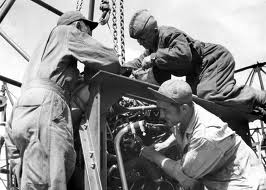
"Not to know what happened before
one was born is to always be a child."
-- Cicero
Defining the precise time period of the World War II era is not as easy as it seems. Most general historians put the time period as existing between 1939 and 1945, beginning with Germany's invasion of Poland on September 1, 1939, and ending with the surrender of Japan on August 15, 1945. But other timeframes are possible, which would extend the beginning or end dates.
Consider, for example, the following:
On March 7, 1936, Adolf Hitler directed nineteen German battalions to cross the border into the Rhineland, in direct violation of the Treaty of Versailles.
October 1935 to May 1936. The Kingdom of Italy occupied Ethiopia, in clear violation of Article X of the League of Nations. The League of Nations took no action.
The Spanish Civil War began on July 17, 1936, and ended on April 1, 1939. Both Germany and Italy supported the insurrection. The German Condor Legion bombed Guernica in April 1937.
Japan invaded China in April 1937. Japan then (unsuccessfully) attempted to invade the USSR on July 29, 1938, and then Mongolia on May 11, 1939.
Germany annexed Austria in March 1938. In March 1939 Germany invaded Czechoslovakia.
On July 18, 1947, The SS Exodus, a ship whose passengers were Holocaust survivors on their way to Palestine, was intercepted by the British Navy, which denied access to Palestine and transferred the passengers to a ship bound for France, following a struggle in which two passengers and a crew member died.
On December 11, 1947, the country of Israel was created by a vote in the United Nations.
Thus, the question of when World War II began and ended might very well depend on where one was at a given time, as well as whether one wishes to consider only strictly military events or also political and societal events.
As a boy, born in the United States in the mid-1950's, the recent history of World War II seemed both pervasive and vague. My family lived in Rhode Island from the time I was four until the time I was twelve, and there V-J Day (Victory Over Japan Day) was celebrated as on official state holiday. There were parades with men in their military uniforms driving Jeeps and other types of military vehicles. And, of course, there were personal associations. My father had enlisted in the army to go and fight, but had unfortunately suffered a heart attack in boot camp and was honorably discharged without seeing military service. His brother entered the Navy, and fought in the Pacific. There was never an ounce of ambiguity about the war - Hitler and the Nazis were evil, and so were those Japanese soldiers that inhumanely tortured prisoners. We - Americans, British, French, and all the rest - were the good guys.
My opinion, after all these years, is still largely unambiguous. There unquestionably were Nazi atrocities, and Japanese atrocities. Of course, there are still plenty of things I'm just learning about World War II and its aftermath. Until I was an adult, I did not know that Ireland was officially neutral in the war. I also did not know that Hungary fought with the Axis powers. I did not know that the UN Partition Plan for Palestine - which created Israel - wasn't as clear-cut or as popular as one might have imagined, and that if the vote had been held on November 26, 1947, the scheduled date, the Plan would not have been approved. I did not know that between ten and twenty million Chinese (civilians and military) died under Japanese occupation.
There are also questions, which is only natural when discussing an historical event of such scope. Would Hungary have entered the war if the Treaty of Versailles had not been so harsh? Why, when discussing the Nazi Holocaust, is such little attention paid to atrocities against European Roma (gypsies)? And, of course, there are reassessments. The Allies were the good guys, except for the Russians - the Soviet mass rape of German women toward the end of the war made that clear, with resulting female deaths estimated at around 240,000.
History fades over time, but one cannot lose sight, because of the passage of time, of the great and heroic efforts made during the war by those who fought, and those who kept the home fires burning. No wars are "good," but some are necessary, and World War II was a necessary war. We should always remember and honor those who rose to this challenge.
Of Related Interest:
Akarius Stamps & Collectibles has a selection of Stamps of the Third Reich for sale.
Disclosure: We are independently owned and the opinions expressed here are our own. We do have advertisements with links to other sites on our pages, and may receive compensation when you click on one of those links and/or purchase something from one of those sites.
Copyright © D. J. McAdam· All Rights Reserved